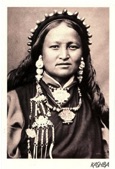Home
KASHBA Asiatica
Ais Loupatty
Ton Lankreijer
Staalstraat 6
1011 JL Amsterdam
Open 12:00 – 17:00
Zondag / Sunday 14:00 - 17:00
Contact:
31-20 - 6 23 55 64
06 - 588 41 370

In Memoriam
Cornelia Loupatty-Lopulissa
by Ais Loupatty
This speech was delivered at the funeral on 9 April 2020. Due to the legislation surrounding the Coronavirus pandemic, the maximum number of attendees was limited to thirty family members.
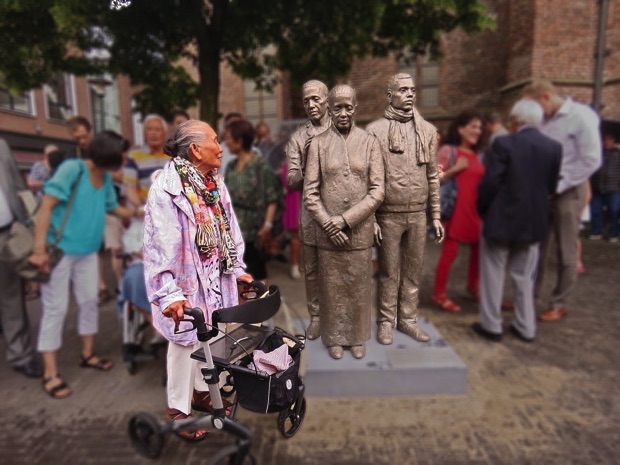
My mother at the Moluccan monument in Barneveld.
I would like to sketch out Mama's life in a detailed obituary. Although she wasn't much of a storyteller, I would still like to try to capture her lifestory.
To us, the Loupatty-Lopulissa family, she was the last of a generation, the last of the original settlers in the Netherlands.
But one day she will also be remembered as the source of all our descendants in this country, as the foremother who came here from afar.
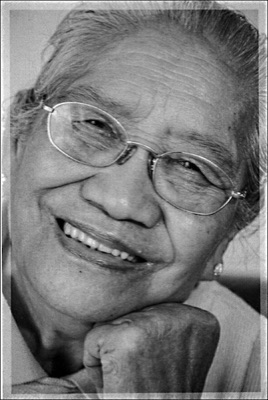
Her story deserves to be told.
Her story deserves to be told.
Her story must be told.
Mama/oma/ojang was born in 1927 in Negeri Tuhaha, on the Moluccan island of Saparua. We know her father, Laurens Lopulissa, as Tete Entjo, and her mother, Martina Wakano, as Nene Tina. The family had four daughters and one son.
Unfortunately, father Entjo dies young. Mother Tina is left alone with five small children.
She sends the children August and Mina to live with her husband's brother in Makassar on Celebes.
The other children, including Mama, remain behind on Saparua, in a simple house with a roof made of atap leaves, along a sandy path to Tuhaha Bay.
One day, the sisters Atu and Mama – actually still two young girls – are on their way to the large pasar of Saparua. Suddenly, Japanese fighter planes appear overhead to bomb the island.
Sister Atu is seriously injured. Mum tears up her sarong and makes a kind of stretcher out of it. With the help of bystanders, she is able to transport her bleeding sister to the hospital.
However, sister Atu loses her life on the doorstep of the hospital.
After the war, in 1948, KNIL soldier Josias Loupatty returned home to Tuhaha from Bali on extended leave.
After the sudden death of his wife Johanna Louhenapessy, he was left behind in Den Pasar with two small children: Francien was barely 6 and Johnny was still a baby.
During his main leave home, he meets mama. On 20 July 1948, they marry at the KNIL office in Ambon City.
Once his leave is over and conscription calls, military rule dictates that “wife and children must follow the soldier to his tangsi'. In their case, that means the Singaradja barracks on Bali.
Not long after, the KNIL orders Papa to leave for Sumatra. Mama stays behind in Bali with her two children.
She has to stay, because she is now heavily pregnant with Otto, or rather Oktovianus Laurens – named after both grandfathers.
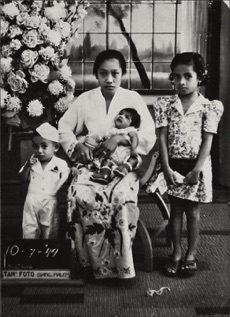
After the birth, she goes to a photo studio to have a family portrait taken and send it to dad in Sumatra.
To show him their new addition.
Not long after giving birth, she and the children are also embarked for Sumatra.
Almost immediately after their arrival, her first child, her firstborn, dies. It hits her hard, her grief is intense. Having to care for the two other little ones makes it even more heartbreaking for her.
Papa decides never again to name a child after a deceased family member.
The portrait photograph of the young family, taken in Bali, travels through the years from barracks to camp, by warship or luxury passenger ship –– and is now hanging on the wall at Anemoonstraat 11.
A year later, in 1950, the family had to move again, this time to the tangsi in Malang on Java, where their second child, August, was born.
Meanwhile, the RMS has been proclaimed on Ambon. Returning to an independent Ambon is not an option for the Moluccan soldiers, however. After much political scheming in The Hague, they are ordered to return to the Netherlands.
And yet, Papa hesitates to board the ship.
He is deeply disappointed in the Hollanders;
too many promises turned out to be empty!
But Mummy thinks, oh well, let's just go,
'katong pi lihat lihat sadikit, let's see, shall we?
It's only for half a year...'
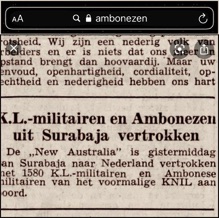
On 7 April 1951, a young family with three children left Surabaya for the Netherlands on the former cruise ship New Australia.
During the voyage, Papa often felt seasick. You might not expect that from a young man born and raised on Saparua, an island surrounded by sea.
The departure of 1,580 KNIL soldiers and Ambonese soldiers.
Meanwhile, Mama remains standing tall. The sea voyage takes three weeks.
On 29 April, the ship docks somewhere behind Central Station in Amsterdam.
Just a small but crucial detail in their lives: during the crossing, the Moluccan soldiers are completely taken by surprise and overwhelmed when they were suddenly dismissed from the army.
Arrival of ‘Ambonese and approx. 500 soldiers from the Royal Army’.
Eventually, Mama and Papa end up in Graetheide, a barracks camp near Geleen in Limburg. That is where Rudy is born – our Udi.
Working is not allowed, but they do get some pocket money.
Cooking is not allowed either; the food comes ready-made and overcooked from the soup kitchen.
Bored—and let's say ‘ unaccustomed' to the food— Mama goes out to explore along with other women. What grows among the crops in all those fields? And what vegetables and herbs grow along the many ditches?
Sometimes she traded some of the large quantities of Molenaars Children's Flour for an egg at the farmer's. Or in the village for a fish – which she then smuggled back inside and fried on the back of the iron.
When leaving Ambon, Mama had promised her mother to look out for her brother August, the child who had been given away to relatives in Makassar years earlier.
All she knows about him is that he also joined the KNIL aarmy and may have been transferred to the Netherlands.
Once in Limburg, Papa tries to form a band with some friends and perform in other camps. Their instruments consist of a guitar, some drums, and a single-string bass made from a tea chest.
Over time, Mama hears that her brother August is in Camp Vught. She decides to go and look for him.
The encounter becomes a close bond—and one of the reasons why we, her offspring, live here in the Netherlands and not in the United States.
But I'm getting ahead of myself.
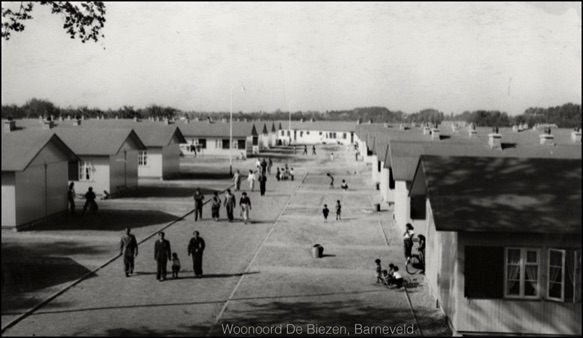
The "temporary stay" of six months in the Netherlands is running out. And running out. And running out.
The former soldiers now have to work in factories; if that isn't a sign that returning is no longer an option, what is?“Then I'll just have to return to the Republic of Indonesia on my own,” thinks Papa — not overly aloud. But his sister in Java works for the local telephone service at a time when calling Indonesia costs more than ten guilders a minute — for others, that is.
Time and again, she strongly advises him against it.
In 1953, the family was relocated by the government to the De Schaffelaar and De Biezen camps in Barneveld.
These former concentration camps for Jews during the Second World War were constructed from thin wooden slats – they were draughty and cold. And yet Ronny, Tjo, Ais, Willy and Gustav are born.
To earn extra money, Mama also starts working in factories, as well as caring for nine children.
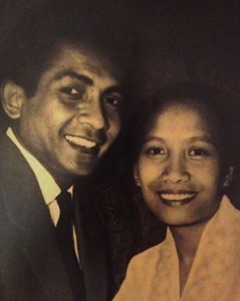
In the camp, Mum and Dad hear that you can sign up for “Emigration to America!”.
Church communities in the US are keen to increase their membership and therefore provide the journey there, as well as a house, school and permanent job.
Papa is interested, as with so few prospects, he does not necessarily need to stay in the Netherlands. A few friends have already gone before him.
But Mama does not want to go, as she has family here: Uncle August!
At Camp de Biezen, Ronny, her fourth child, falls ill. His arm is amputated. He becomes more and more ill.
She visits her troubled child for months in the hospital in the village of Bennekom, an hour away by bus.
On 7 May 1966, he dies at the age of eleven. Also the death of this second child affects her deeply. Less than a year later, Francien dies as well - at the age of 25.
Those were tough times for Mama, the sixties. Yet she always managed to pick herself up again.
She started working at the Nobo biscuit factory — which we all have “delicious” memories of.
And despite all her worries, she continued to sing in the church choir.
She truly loved singing — it kept her going.
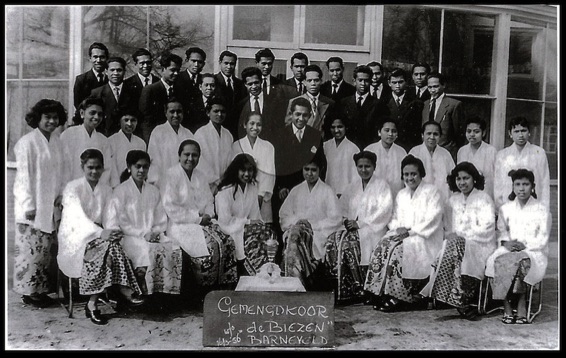
Singing for God, but also for the Queen during a Moluccan commemoration in the Ridderzaal — with Papa as choir conductor.
And later during the Remembrance Day ceremony in the Nieuwe Kerk in Amsterdam – this time with her son August as conductor.
Her faith was her anchor, without a doubt.
She sees it as a parental duty to have her children baptised and profess their faith.
In the end, her greatest wish came true. After eight boys, she finally had a girl. Better still, she had two girls: Mary and Laura. Together, they became her support and confidant.
Mama loved Papa very much. Papa had initiatives. She was happy to go along with them. In 1991, however, that came to an end. Papa died after a long illness. After almost 45 years, she was left alone. But once again, she picked herself up.
She travelled to Indonesia with her children and grandchildren. She loved telling them about her childhood in Tuhaha, in that little house with a roof made of atap leaves, along the path to the sky-blue bay.
Her long-standing, close friendship with her two sisters, Aunt Ado Lisapalij and Aunt Obe Leatemia, also kept her going.
Aunt Ado was the expert on snooker, mama the only real football connoisseur. A true Ajax fan, that's for sure, but nationally or internationally — she knew them all by name.
During European Championship and World Cup tournaments, she kept track of the results and standings.
“Why aren't so-and-so in the line-up...!?!” she would sometimes shout at the start of a match — we weren't surprised anymore.
When Ajax played, she would go to bed during half-time. She was convinced that this would help her club win. According to her, it had “worked” once, so she stuck to it.
But she was hardly out of bed the next morning before she asked who had won. Then she sat down to watch the entire match in peace.
The death of Aunt Ado, just over a month ago, affected her deeply; she had just missed celebrating her 100th birthday.
Due to the coronavirus crisis, Mama became isolated. She spent her days indoors with Laura. No children or grandchildren visiting, no cuddles with great-grandchildren.
Two weeks ago, she suddenly fell ill. She lost her appetite and just wanted to sleep. Ultimately, double pneumonia proved fatal.
A true matriarch, she was able to say goodbye to her beloved family in the garden from her bed in the living room.
Held by Mary and Laura, who each held one of her hands, she breathed her last peacefully early the next morning.
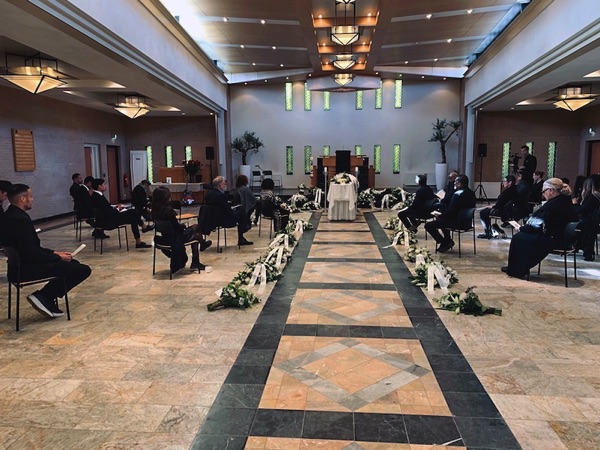
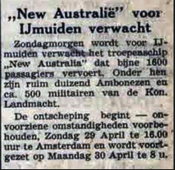
5 mei 2020 15:35
All photographs and texts ©Kashba Ais Loupatty & Ton Lankreijer.Webdesign:William Loupatty
